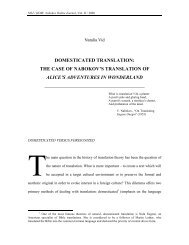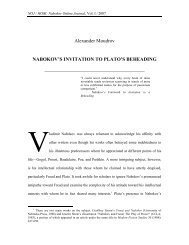Create successful ePaper yourself
Turn your PDF publications into a flip-book with our unique Google optimized e-Paper software.
Nabokov Online Journal, Vol. V (2011)<br />
_______________________________________________________________________<br />
allows that it can. The structural irony of the diary’s existence complicates the<br />
relationship between the two texts.<br />
The act of keeping the diary is a rebellious gesture; it is an attempt to gain some<br />
form of agency, even co-authorship, over the events it narrates, thus shaking the authority<br />
of the stepfather’s text and changing the reader’s view thereof. For the diary’s publication<br />
to fulfill its aim, then, it has to be read alongside the original rendition of events, starkly<br />
affirming its parodic status; the word “parody” is derived from the combination of the<br />
Greek para, “alongside,” and oide, “song.” According to Russian Formalist Iurii<br />
Tynyanov, parody performs a dual function: it imitates and transforms (104). Without<br />
knowledge of the original text, the reader of the diary would be unable to appreciate its<br />
transformative, parodic purpose.<br />
In the English translation of Diario di Lo, however, the foreword of the fictional<br />
John Ray is preceded by another, in this case attributable to an actual person – Dmitri<br />
Nabokov, the son of Vladimir Nabokov, who wrote the original novel alluded to in the<br />
body of the Italian text and whose estate owns the copyright thereto. In his foreword,<br />
Dmitri Nabokov questions the transformative purpose of Lo’s Diary and claims that the<br />
novel constitutes an act of piracy, plundering and devaluing his father’s original work.<br />
Nabokov thus evinces the view that the author of the derivative work should have<br />
recompensed his father’s estate monetarily for the aesthetic value that it diminishes in the<br />
original. The foreword is provided for by a settlement clause in the agreement reached<br />
between Dmitri Nabokov and Barney Rossett, the owner of Foxrock Books. That Rossett<br />
also happens to have formerly headed Grove Press is perhaps ironic, insofar as Grove<br />
sought the rights to publish the first American edition of Vladimir Nabokov’s Lolita in<br />
1955, when many other publishers refused to take on such a controversial book. 2 With<br />
Lo’s Diary, Rossett had once again stepped up to the plate to champion another<br />
contentious literary work, in this case after its would-be English-language publishers<br />
(Farrar, Straus & Giroux in the U.S., and Macmillan in the U.K.) had backed out of their<br />
contracts with Pia Pera upon being sued by Dmitri Nabokov, who accused them of<br />
plagiarism and copyright infringement.<br />
2 Grove was unsuccessful in this attempt, and the first American edition was published by Putnam the same<br />
year.<br />
2

















